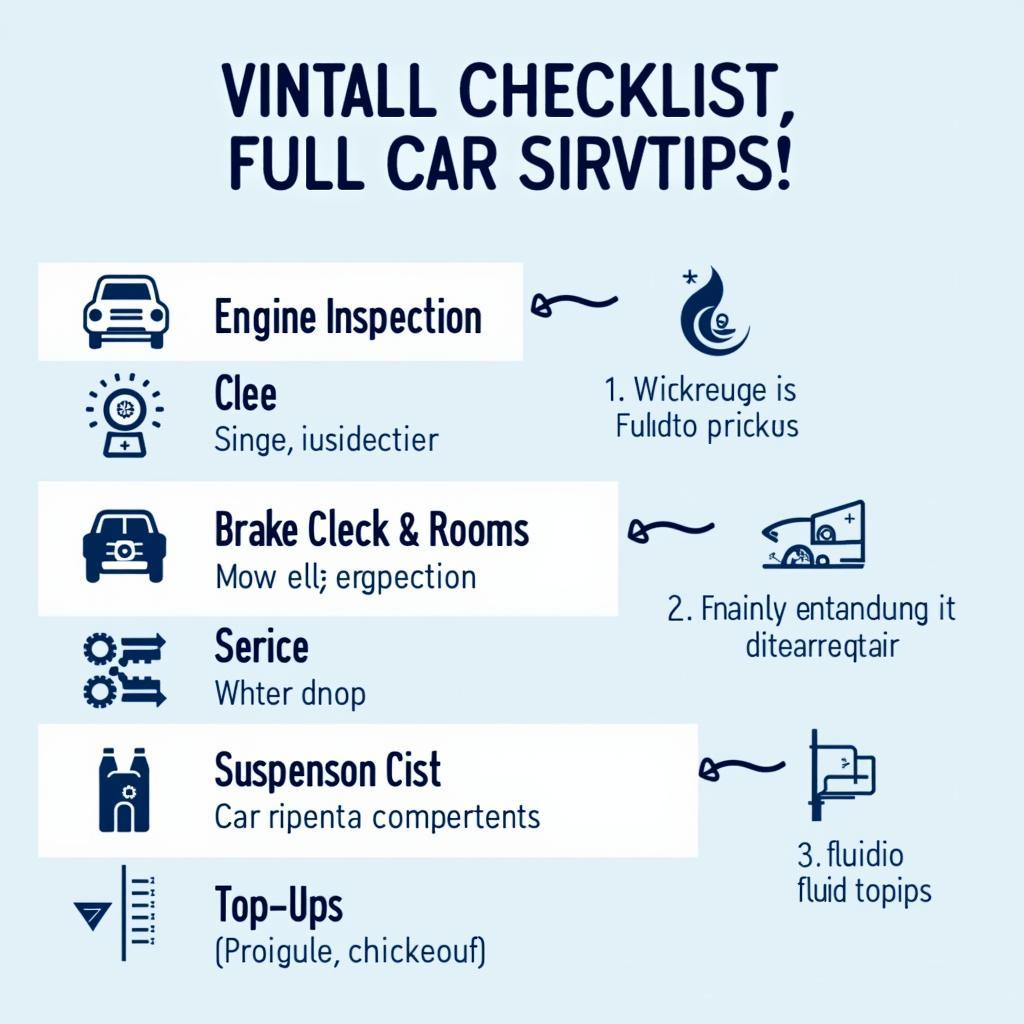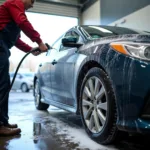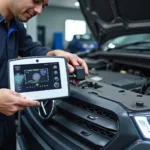A full car service is a comprehensive check and maintenance procedure designed to keep your vehicle running smoothly and safely. It’s more in-depth than a basic service and covers a wider range of components. Understanding what’s done on a full car service empowers you to make informed decisions about your car’s maintenance and helps you avoid unexpected repairs down the road. Let’s delve into the details.
What Does a Full Car Service Entail?
A full car service addresses nearly every aspect of your vehicle’s functionality, ensuring optimal performance and longevity. While specific checks may vary slightly between garages, a standard full car service covers the following key areas:
- Engine Inspection: This includes checking the oil level, coolant level, and condition of various belts and hoses. Spark plugs are also inspected and replaced if necessary.
- Brake System Check: Brakes are crucial for safety. A full service includes inspecting brake pads, discs, and lines for wear and tear. Brake fluid levels are checked and topped off if needed.
- Suspension and Steering: The mechanic will inspect the suspension components, including shock absorbers and springs, for signs of damage or wear. The steering system is also checked for proper function.
- Exhaust System: The exhaust system is checked for leaks, damage, and proper emissions.
- Electrical System: This involves checking the battery, alternator, and starter motor for proper operation. Lights, indicators, and other electrical components are also tested.
- Tires and Wheels: Tire pressure and tread depth are checked. Wheel alignment and balance may also be part of the service.
- Fluid Checks and Top-ups: Essential fluids like engine oil, coolant, brake fluid, power steering fluid, and transmission fluid are checked and topped off as necessary.
- Filters: Various filters, including the air filter, oil filter, and fuel filter, are typically replaced during a full service.
After the initial inspection, any necessary repairs or replacements will be discussed with you before they are carried out.
Just after the introduction, we recommend reading about how much a full car service should cost at how much should i pay for a full car service. This can help you budget appropriately for this essential maintenance.
Why is a Full Car Service Important?
Regular full car services are essential for maintaining the health, safety, and value of your vehicle. They can prevent costly repairs by identifying and addressing potential problems early on.
- Safety: A full service ensures that crucial safety systems like brakes and steering are in good working order, reducing the risk of accidents.
- Reliability: Regular maintenance helps prevent breakdowns and keeps your car running smoothly.
- Resale Value: A well-maintained vehicle with a full service history will command a higher resale price.
- Fuel Efficiency: A properly tuned engine and clean filters can improve fuel economy, saving you money on gas.
How Often Should I Get a Full Car Service?
Generally, a full car service is recommended every 12 months or 12,000 miles, whichever comes first. However, this can vary depending on your vehicle’s make and model, as well as your driving habits. Refer to your owner’s manual for specific recommendations.
Is a Full Car Service the Same as a Major Service?
While the terms are often used interchangeably, there can be subtle differences. A major service typically includes everything in a full service, plus additional checks and replacements, such as changing the timing belt or spark plugs. To avoid confusion, it’s always best to clarify with the garage exactly what’s included in their “full service” and “major service” packages. You might find our article on major car services helpful: what’s included in a major car service.
What Factors Affect the Cost of a Full Car Service?
Several factors can influence the cost of a full service, including:
- Vehicle Make and Model: Luxury or high-performance vehicles often require more specialized parts and labor, resulting in higher service costs.
- Garage Location: Service costs can vary based on the location of the garage and the local market rates.
- Specific Services Included: The exact services included in the “full service” package can impact the overall cost.
For a more in-depth understanding of car servicing costs, you can refer to our article: what is the cost of servicing a car.
What Questions Should I Ask My Mechanic?
Before getting a full car service, it’s always a good idea to ask your mechanic a few questions:
- What exactly is included in your full service package?
- Are there any additional services recommended for my vehicle?
- What is the estimated cost of the service?
- How long will the service take?
Conclusion
Understanding what’s done on a full car service is crucial for responsible car ownership. By investing in regular maintenance, you can ensure the safety, reliability, and longevity of your vehicle, ultimately saving you money and hassle in the long run. Don’t neglect your car’s health – schedule a full car service today.
Knowing when your car’s AC needs attention is also crucial. Check out our article on car AC service: is car air conditioning service necessary. Also, understanding the process of an oil flush can be beneficial: what is oil flush in car servicing.
Need help with car diagnostics or service? Contact us via WhatsApp: +1(641)206-8880, or Email: [email protected]. Our team is available 24/7 to assist you.


